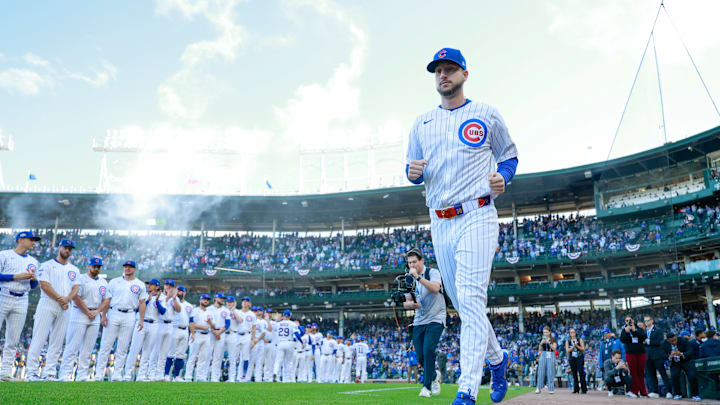Ask 10 fans of the Chicago Cubs what the No. 1 objective of their team's offseason should be, and at least eight or nine will give you the same answer: Find a way to make sure outfielder Kyle Tucker sticks around in free agency. Set aside the fact that Chicago gave up multiple controllable pieces, including a starting infielder in Isaac Paredes and top prospect in Cam Smith, to acquire him from the Houston Astros last offseason; even if you want to consider that a sunk cost, it's hard to imagine how the Cubs will be better in 2026 without the guy who was their best all-around hitter in 2025.
If anybody would be feeling the heat ahead of what figures to be a massive bidding war for Tucker's services, it's Cubs president Jed Hoyer. After all, he's the guy who pulled the trigger on the initial trade, and he also watched his team flame out in the NLDS in its first playoff appearance in a full season since 2018.
And yet, asked about Tucker at his end-of-season press conference on Wednesday, Hoyer sounded like a man filing his taxes: "Everyone can use a guy like Kyle Tucker," he said, while praising his All-Star's performance this year. "Everyone gets better by having a player like that, we’ll certainly be having those conversations."
“We’ll certainly be having those conversations.”
— Marquee Sports Network (@WatchMarquee) October 15, 2025
Jed Hoyer on the potential of signing Kyle Tucker. pic.twitter.com/eIcsfuUM0L
But as soon as he'd gotten through those platitudes, it was back to business as usual. And for Cubs fans, "business as usual" should be read as derogatorily as possible.
“Not connected to Kyle, I just think, in general, you have to evaluate," Hoyer continued, via the Athletic. "You have to start everything that we do with a valuation of the player, and focus on that valuation. And then, what’s that worth to the organization? That’s the backbone."
Somehow, he wasn't done reciting lines from the world's most underwhelming PowerPoint presentation.
“In my career, when you make decisions that are based on your valuation and how you value the player, then it sort of takes some of the other stuff out of it," Hoyer said. "You make better decisions. If you’re reacting to how things are going around you, I think that’s when you can make a real mistake.”
"Evaluate"? "Valuation of the player"? "What's that worth to the organization"? Not wanting to "make a real mistake"? That's vintage Hoyer stuff, baby. From the sound of it, he's approaching this negotiation the same way he's approached everything else about his tenure leading Chicago's front office. And that should be very, very scary for Cubs fans.
For more news and rumors, check out MLB Insider Robert Murray’s work on The Baseball Insiders podcast, subscribe to The Moonshot, our weekly MLB newsletter, and join the discord to get the inside scoop during the MLB season.
Jed Hoyer is going to make the same mistake all over again with Kyle Tucker's free agency
If there's one thing that has defined Hoyer's time on the North Side, it's patience — often to a fault. It was one thing when the Cubs were in the depths of their post-World Series rebuild, simply trying to get some contracts off the books while acquiring young talent. But those days are long gone, and Hoyer is still operating almost entirely without urgency.
That's part of why the Tucker trade felt so thrilling at the time. Finally, here were the Cubs going all-in, acting like they were one of the richest teams in the sport. Sure, Tucker would be a free agent in a year's time, but so what — this team was ready to win now, and besides, clearly this showed a seriousness about making a run at him on the open market.
And then, bafflingly, Hoyer went back to business as usual. His rotation needed bolstering in the offseason, but all he brought in was Matthew Boyd. His entire pitching staff needed bolstering at the trade deadline, but all he was willing to pay for was Michael Soroka. In the wake of giving up real value for a one-year rental, Hoyer suddenly reverted to the guy who would rather die than go through with a transaction the team's spreadsheets didn't approve of.
Which doesn't bode well entering a pivotal offseason. Hoyer should know by now that if you insist on being the one rational member of a fundamentally irrational market, you're not actually getting a leg up; you're just committing yourself to coming in second or third place over and over and over again. At a certain point, you just need to do what it takes — especially when all it will cost is money, and especially when you print money the way the Cubs do. And yet, here he is, talking the same talk about making smart evaluations and not letting outside noise get you to deviate from your plan.
Which just makes the initial Tucker decision more baffling, frankly. Why pull the trigger once if you weren't willing to follow through on it? Why give up years of controllable players if you were just going to punt rather than make a real run at signing him long term? What will it take for Hoyer to do what's necessary to actually, you know, acquire players? This Cubs team needs one final push to get it over the hump, but their front office doesn't seem to have any interest in providing it.
